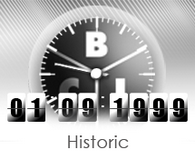
As a result of general policies aimed at the liberalization of the economy, the Mauritanian banking sector experienced profound changes at the end of the nineties.
Aware of the new stakes and the economic opportunities that this implied, a well-known businessman, Isselmou TAJIDINE, decided to apply for approval of the creation of a new bank.
Apart from the Mauritanian associates, he appealed to three European partners who he had been working with for many years.
These last three (two Dutch and one French) who knew both the country, and his qualities as promoter, committed themselves to one third of the project.
The Central Bank gave its approval in April 1999 and in September of the same year the “Banque pour le Commerce et de l’Industrie” (BCI) opened in Nouakchott.
 Total assets multiplied by more than 11,
Total assets multiplied by more than 11,
 Share capital multiplied by 14.5,
Share capital multiplied by 14.5,
 Equity capital multiplied by 11,
Equity capital multiplied by 11,
 Solvency and liquidity ratios reaching respectively 30% and 40%, compared to their regulatory level of 10% and 20% respectively,
Solvency and liquidity ratios reaching respectively 30% and 40%, compared to their regulatory level of 10% and 20% respectively,
 An expansion realized with the opening of 16 branches spread throughout the country, with a total of 33 agencies in the sub-region,
An expansion realized with the opening of 16 branches spread throughout the country, with a total of 33 agencies in the sub-region,
 The opening of subsidiaries in Mali (2007), Guinea (2012) and Senegal (2015),
The opening of subsidiaries in Mali (2007), Guinea (2012) and Senegal (2015),
 The biggest Mauritanian bank internationally,
The biggest Mauritanian bank internationally,
 An international reputation which allows BCI-Mauritania to dispose of over USD 120 million in its credit lines, with first class institutions such as Citibank, Natixis, Société Générale, Bred Bank, UBAF ...
An international reputation which allows BCI-Mauritania to dispose of over USD 120 million in its credit lines, with first class institutions such as Citibank, Natixis, Société Générale, Bred Bank, UBAF ...
The growth of the BCI has resulted in very satisfying performances which have placed it among the top banks in the country. Rigorous management and strict respect of its commitments has meant that the reputation of the BCI has been well-established in Mauritania, as in other foreign countries.
And finally, the bank has also known how to develop a network of several dozen financial and banking correspondents in most of the countries its clients work in, at the top of the list being Natixis-Banques Populaires, correspondent and adviser right from the start, Citibank, the European Investment Bank (EIB) and also the Islamic Development Bank (IDB) which opened up lines of credit aimed at overcoming the lack of resources in the long term - from which the country suffers.